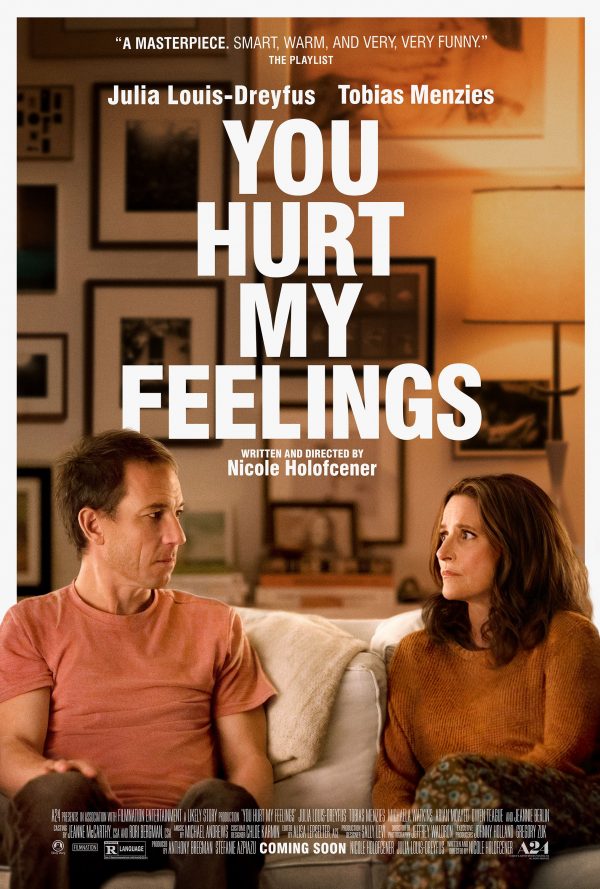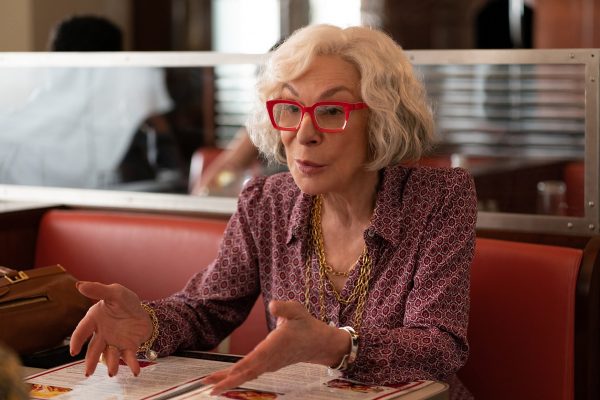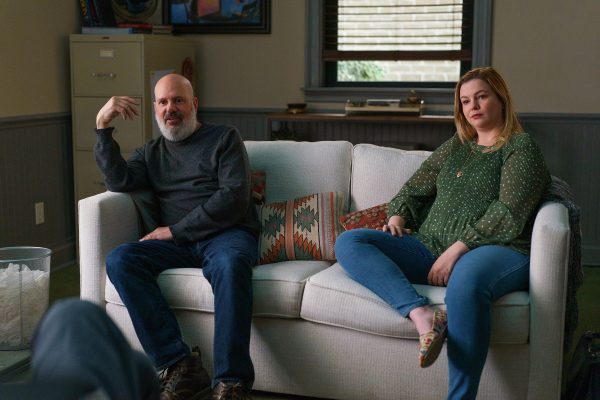
“You Hurt My Feelings” (2023). Cast: Julia Louis-Dreyfus, Tobias Menzies, Owen Teague, Michaela Watkins, Arian Moayed, Jeannie Berlin, Amber Tamblyn, David Cross, Zach Cherry, Doug Moe, Trey Santiago-Hudson, Erica Martin, Karolena Theresa, Lynnsey Lewis, LaTanya Richardson Jackson, Claudia Robinson, Clara Wong, Josh Pais. Director: Nicole Holofcener. Screenplay: Nicole Holofcener. Web site. Trailer.
The primary story thread involves the relationship between Beth Mitchell (Julia Louis-Dreyfus), a reasonably successful author whose works are often looked on as not quite living up to their marketplace potential, and her husband, Don (Tobias Menzies), a well-meaning, middle-aged psychiatrist who feels he’s losing his edge, as borne out by some of the unflattering comments he receives from his patients. Despite their respective career challenges, Beth and Don are nevertheless thoroughly devoted to one another, having been happily married for many years. They support one another’s efforts unquestionably, always finding ways to buck up each other when they feel stressed. They’re also the proud parents of a twenty-something son, Eliot (Owen Teague), a struggling playwright who manages a marijuana dispensary to pay the bills, a job that worries Beth given its somewhat questionable clientele and associated safety factors (even though she freely smokes weed herself).

The second principal story thread involves Beth’s sister, Sarah (Michaela Watkins), a people-pleasing interior designer who attempts to satisfy the tastes of a number of high-end fussy clients, and her significant other, Mark (Arian Moayed), an enthusiastic but struggling actor. Beth and Sarah spend a great deal of time together, volunteering at a neighborhood church clothing bank, shopping in the city and visiting their aging, quirky mother, Georgia (Jeannie Berlin), whose frank, uncensored comments are sometimes a little more candid than the sisters want to hear. And, while Beth and Sarah are out bopping around town, their partners, Don and Mark, spend a lot of time with one another as well, often serving as sounding boards for one another.
Even though the two couples have their professional issues to contend with, they still manage to live fairly happy and fulfilling lives. That all changes one day, though, when Beth and Sarah have an unexpected encounter with Don and Mark. While impulsively visiting a sporting goods store, the sisters spot their partners from a distance with their backs turned toward them. Beth proposes that they sneak up from behind them to give them a surprise hello. However, as they make their approach, Beth overhears Don saying that he doesn’t like his wife’s new book, that he doesn’t feel it and that it doesn’t speak to him. And, as he freely offers up his comments, he’s unaware that Beth is standing behind him and that she heard everything he said.
Needless to say, Beth is devastated. She and Sarah turn away without the guys ever having been aware that they were present and within earshot. Don is thus completely unaware that Beth heard his reaction to her latest work and the pain that his criticism caused her. Now what?
Things at home become frosty rather quickly, and Don is confused by the standoffish treatment he receives. Beth is evasive about discussing the situation, too, and she quickly finds cover for this behavior when Eliot returns home with a problem of his own – a difficult breakup with his girlfriend. Eliot’s heartache provides a convenient diversion for Beth, giving her an opportunity to focus her attention on comforting her son and to avoid bringing up her disappointment with Don, who simultaneously and unreservedly joins in offering solace to his son but remains puzzled while receiving the cold shoulder from his wife.

Meanwhile, as Beth anguishes over what she perceives as Don’s seeming insensitivity, he wrestles with growing discontent from his patients, including Jon and Carolyn (David Cross, Amber Tamblyn), a couple experiencing marital troubles who feel they’re making little progress in their counseling, and Jim (Zach Cherry), a malcontented young man who’s having difficulty getting along with his family and believes therapy is doing little to help him. Don begins to wonder if he’s lost his effectiveness as a therapist – not to mention as a supportive husband.
Fuel is dowsed on Beth’s fire when she begins to wonder if Don’s criticisms about her writing are correct. She repeatedly hears comments from multiple sources that sales of her previous book could have been better due mostly to the underwhelming marketing efforts put forth by her agent (LaTanya Richardson Jackson). She’s also astounded when the students in the creative writing course she teaches have never even heard of that title, despite being aware of comparable works from other authors.
As all this plays out, other characters experience their share of disappointments as well. These developments are either uncovered through brutally honest revelations or brought up during discussions about how much they can genuinely trust the supposedly encouraging “honesty” they received from others. Indeed, can well-meaning but knowingly insincere support do just as much harm to one’s beliefs about oneself and one’s work as harsh but frank truthfulness?
Suddenly, questions surrounding the sanctity of honesty don’t seem quite so clear-cut. The shades of gray that emerge in this discussion quickly overtake the unassailable black-and-white view that many of us might have held going in to this story. But, by bringing up these issues for debate, as they are here, audiences have an opportunity to examine them from a much more realistic perspective, enabling us to see that a one-size-fits-all approach to this subject is far from appropriate in all situations. “You Hurt My Feelings” illustrates the importance of considering all of our options before acting in scenarios like these so that we choose the ones that best suit the circumstances before matters get out of hand.

From this, it’s apparent that revealing truths and opinions to others carries a tremendous degree of responsibility with it, both for those sharing these notions and for those receiving them. For example, those unearthing potentially troubling news or opinions to those who are sensitive or easily hurt must bear in mind the possible consequences of such disclosures in determining the approach used to pass along this information. Even if we believe that honesty is the best policy, simply blurting out such revelations without taking another individual’s feelings into account could cause as much harm as the news itself. Is that truly being helpful?
At the same time, we must also consider the impact of soft-peddling news and opinions. In an attempt to be considerate and tactful in sparing someone’s emotions or avoiding undue dismay, we might end up unwittingly conveying false hope, wishful thinking or unrealistic expectations about someone’s undertakings. Telling someone who weighs 300 pounds to have hope that he’ll eventually be able to fulfill his dream of becoming a jockey isn’t realistic – or helpful. While a deft touch might prevent hurt feelings in the short term, it could cause big problems in the long run. Indeed, telling someone that he or she will be able to succeed at something for which the individual lacks the requisite skills or experience could be setting up that person for inevitable disappointment and painful failure.
This is particularly true when it comes to being honest with loved ones; the hurt of such perceived betrayals can run long and deep. When Beth tells Don that he’s a fine therapist despite the complaints from his patients, is she offering loving support or prompting him into denial about what may actually be true? Likewise, when Beth and Don continually tell Eliot that his play will be a success, are they being encouraging parents or are they offering unrealistic guidance, especially given how much he appears to be struggling with his writing? That’s a particularly crucial concern in this instance, given that Don is a counselor and Beth is a writer: Given their professions, shouldn’t they be able to readily sniff out trouble where their son’s aspirations are involved? And, if they don’t genuinely believe in his efforts, aren’t they giving him the aforementioned false hope, wishful thinking and unrealistic expectations?

As noted earlier, there’s as much a responsibility issue for the recipients of these revelations as there is for those imparting them, and, again, beliefs play a crucial role. For instance, when Beth considers Don’s comments about her new book, is she keeping them in perspective, or is she letting her imagination carry her away? If he doesn’t like the new book, does that somehow automatically translate into a dislike of her entire body of work? Similarly, if he has issues with her latest literary project, does that mean he has issues with her in general? Most of us would probably say that those notions are obviously the products of a runaway imagination, one fueled by beliefs related to hurt feelings and an inflated lack of confidence. That doesn’t dismiss the fact, though, that Beth has allowed these ideas to course through her consciousness. It’s something she must be careful about lest those thoughts be made manifest as bona fide creations. It’s thus incumbent upon her to keep those notions in check, dismissing them and keeping them from materializing, no matter what may have prompted them to begin with.
The question of responsibility carries over into other areas of this story as well, perhaps best evidenced by Don’s patients Jon and Carolyn. They represent a case where they need to hear about their circumstances with genuine honesty, something that Don has been withholding in hopes of smoothing over the conditions of their relationship. However, such well-meaning tactfulness on his part has kept the couple from resolving their problems (and hearing what they need to hear), which is why they’ve felt they’ve made such little progress after several years of counseling. Clearly their marital problems rest with them, and they’re the ones who need to make the effort to solve them, with Don providing guidance along the way. Unfortunately, he hasn’t given them the kind of advice that they really need – something he needs to change if he ever expects them to make any progress. But will he? Is he being too nice when he needs to be more forthright?
As the film progresses, a significant outgrowth emerges from all of the various story threads, one that doesn’t directly involve honesty itself but that relates to how the characters react to it – our feelings of self-worth, especially those at the cross-roads of middle age. The key consideration in this revolves around a central question: How much do we equate our professional accomplishments with our feelings about how we see ourselves as worthy individuals? Beth, for instance, measures herself against the success of her writing. Don does the same with his counseling efforts with his patients. Eliot undergoes this with the frustratingly glacial pace of the work on his play. Mark wrings his hands over his inconsistent success with landing acting roles. Sarah wrestles with this in her dealings with her design clients, such as Ali (Clara Wong), a finicky upscale yuppie for whom she has protracted difficulty finding a suitable sconce for her living room. And, through it all, Beth and Sarah routinely get their regular doses of lukewarm approval from their mother, who always seems to think that they could do better in their respective endeavors.
But are these achievements the true measure of a rewarding, fulfilling life? And, even if they don’t live up to expectations (and we’re fully aware of that in all honesty), should we allow that to detract from whatever other satisfaction we’ve attained in our lives? The film urges us to ask ourselves these questions and to put our observations about them into perspective. If we do that, we just might find that our feelings won’t get hurt after all.

One thing for sure you can say about the films of writer-director Nicole Holofcener is that they’re rarely what you expect but that they always deliver more than you hope for. What’s more, given her recent track record, she keeps getting better and better with each release. Building on inventive narrative styles, precise cinematic pacing, superb character development, a knack for perfectly capturing the unexpected and impeccable writing quality developed in her recent directorial works (“Please Give” (2010) and “Enough Said” (2013)), as well as her spot-on screenplay aptitude in “Can You Ever Forgive Me?” (2018), the filmmaker has done it again in this insightful comedy-drama, a piercing treatise on the nature of honesty and the place it should occupy in our lives.
Holofcener’s multi-layered storytelling approach covers a great deal of ground, from how much honesty is too much to taking personal responsibility for resolving one’s own issues to wrestling with the ennui of nagging midlife challenges (particularly where matters of career performance are involved), and the overlapping story threads integrate seamlessly, often with carefully crafted, boomerang effects. This is also the filmmaker’s funniest work to date, evoking big laughs throughout and in some of the unlikeliest of situations (who would have thought that an armed robbery could be funny?). But, in addition to making viewers laugh, the film also makes them think, serving up incisive scenarios that truly give audience members much to contemplate, including incidents that they might have otherwise failed to consider. This is all stunningly brought to life by the positively stellar ensemble cast, especially Julia Louis-Dreyfus in one of her best-ever lead performances. To be sure, the story meanders a bit at the outset, but the opening act is decidedly designed to set up what’s to come, all of which plays out flawlessly as the picture unfolds. “You Hurt My Feelings” may not conform to convention or deliver what viewers expect going in, but, like a well-prepared dinner, it definitely satisfies one’s appetite for a thoroughly satisfying meal. View hearty, everyone. The film is playing theatrically.
Copyright © 2023, by Brent Marchant. All rights reserved.

No comments:
Post a Comment